Scam Alert: Fake Battlefield 6 Beta Ads Are Stealing Steam Credentials
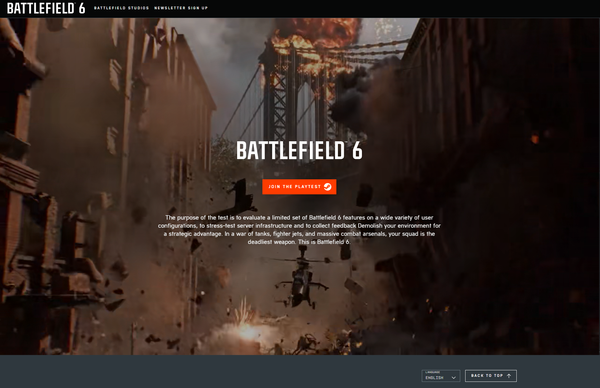
Note: All product and company names mentioned herein are for identification purposes only and are the property of, and may be trademarks of, their respective owners.
A new phishing campaign is sweeping through Meta platforms (Facebook and Instagram), targeting gamers excited about the leaked Battlefield 6 beta. Launched in the wake of gameplay and release rumors on July 28, the scam uses fake ads to lure victims into handing over their Steam login credentials via a fraudulent login page.
The Scam Ads
Scammers are exploiting the viral buzz around Battlefield 6 by running deceptive ads claiming players can sign up for early access or a “closed beta test.” But clicking through the ad leads users to a cloned Battlefield 6 website and, eventually, a fake Steam login page designed to steal account credentials.
According to Bitdefender’s Ionut Baltariu, the scam ads have already reached over 350,000 users across Europe alone. The campaign targets men of all ages, a demographic traditionally drawn to Battlefield titles. At least six versions of the ad have been observed so far.
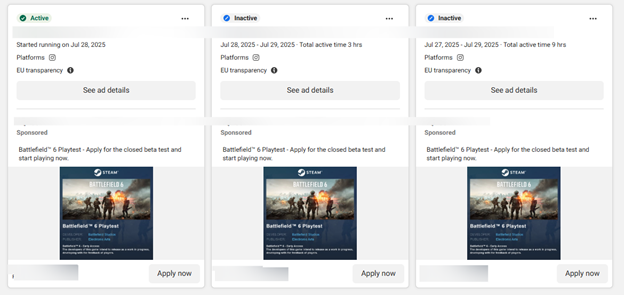
How the Scam Works
Ads were activated shortly after Battlefield 6 gameplay leaks, a common tactic scammers use to ride trending news. They use real logos (Steam, EA, Battlefield Studios) to appear authentic and promise early access to a “Beta Playtest.”
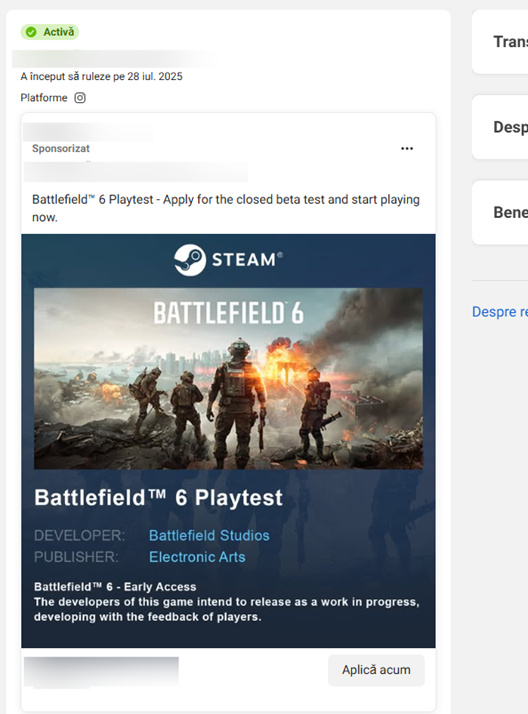
Users who click on the link are redirected to a page that mimics EA’s official Battlefield 6 site: ea[.]com/games/battlefield/battlefield-6
A Prominent “JOIN THE PLAYTEST” button misleads users into believing they’re registering for the beta.
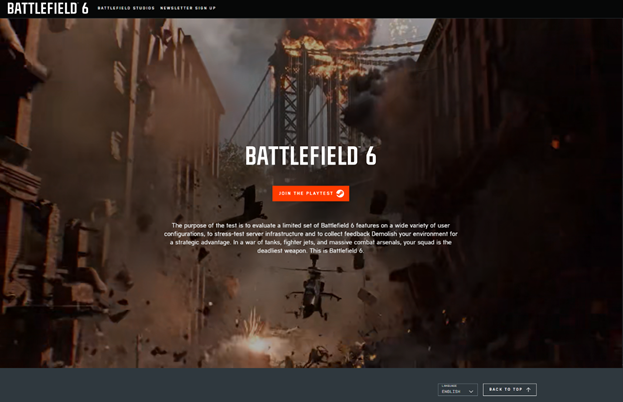
Users are then directed to a fake Steam login page that includes a working QR code, further boosting its legitimacy.
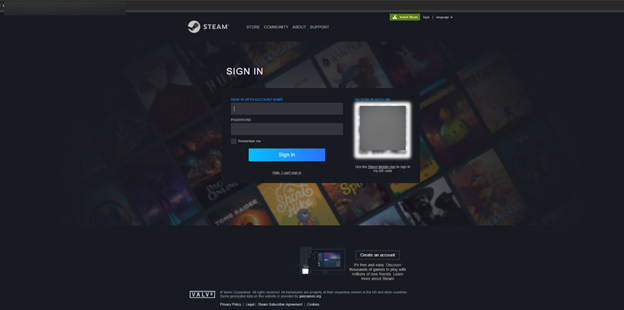
Don’t Fall for the Trap: Tips for Staying Safe
Scammers love hijacking viral moments. Whether it's a beta leak, a celebrity announcement, or breaking game news, they adapt quickly to lure victims through:
- Fake login portals
- QR code phishing
- Lookalike domains
- Ad placement on trusted platforms
To stay ahead of them:
Before clicking on ads or external links, scan the destination URL with Link Checker to see if it's safe. It’s free to use and helps you catch malicious domains like the one used in this scam.
Scamio is your free AI-powered scam assistant. You can ask Scamio to verify:
- Suspicious ads
- Dubious texts or offers
- Links or even QR codes from login pages—yes, including the Steam QR scam in this campaign.
Just upload a screenshot or paste the link and Scamio will tell you if something smells phishy.
What to Do If You Fell for It
- Change your Steam password immediately
- Enable Steam Guard and 2FA
- Revoke sessions from unrecognized devices
- Check your trade history and game library for unusual activity
Not the First Time: This Is a Pattern
This scam is eerily similar to the fake Witcher 4 beta scam we previously covered here:
Scammers Target Gamers with Witcher 4 Beta Scam
In that campaign, fake Facebook ads led users to malicious links where their Steam accounts were hijacked. The only difference? This Battlefield 6 campaign had a far higher reach.
Don’t trust game beta invitations that come through social media ads or unsolicited links. Always verify release announcements through:
- Official developer sites (like EA or Steam)
- Trusted gaming news outlets
- Known game publishers
Until EA formally confirms an open beta, any ad offering Battlefield 6 access is most likely a scam. Use Scamio and Link Checker to help you spot them.
tags
Author
Alina is a history buff passionate about cybersecurity and anything sci-fi, advocating Bitdefender technologies and solutions. She spends most of her time between her two feline friends and traveling.
View all postsRight now Top posts
How Do You Manage Your Passwords? We Ask Netizens
December 18, 2025
Cybercriminals Use Fake Leonardo DiCaprio Film Torrent to Spread Agent Tesla Malware
December 11, 2025
FOLLOW US ON SOCIAL MEDIA
You might also like
Bookmarks







